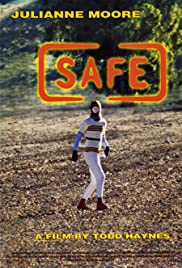
How do you cope? London, the present day. Lonely screenwriter Adam (Andrew Scott) is flirted with by his drunk tower block neighbour Harry (Paul Mescal), whom he rebuffs. He visits his unoccupied former childhood suburban home in Croydon and finds his parents (Jamie Bell and Claire Foy) there. They died in a car accident when he was twelve (Carter John Grout). Returning to his London flat, he reciprocates Harry’s interest and they have sex. Adam comes out as gay to his mother, who accepts him but reacts with concern. He has sex with Harry again, and then Harry describes his own feelings of distance from his family. Adam talks to his father during his next visit, who accepts him for who he is and tearfully reconciles with him over the bullying he faced as a child. Adam and Harry go clubbing and do ketamine together, causing Adam to imagine a long-term relationship with him, then black out and wake up in his parents’ house on Christmas. Unable to sleep, he gets in bed with them and tells his mother about how he was sent to stay with her mother after her death but they are interrupted by Harry appearing in bed with them. Adam wakes on a train and pursues Harry onto another, seeing a vision of his younger self screaming in the reflection of the window before waking in his bed, Harry having taken him home after he panicked while high. He tells Harry about how his father died instantly but his mother lingered for several days, though his grandmother kept him from seeing her, and how their deaths grew into a great terror of being alone. He decides to show Harry his parents but finds the house empty, though Harry catches a glimpse of them as Adam breaks a window to get in … I’m not a proper writer. I write scripts. Writer/director Andrew Haigh’s quasi-autobiographical exploration of his past is actually derived from a 1987 Japanese novel Strangers by Taichi Yamada previously adapted for the screen as The Discarnates (1988). The time-slip structure gives this fantasy a generic mode that fuses the present-day concerns of a man coming to terms with his past not just in terms of grief but of having grown up gay in the Eighties. Haigh integrates his own life into the story, even using his childhood home as a location so that this is imprinted with concerns that echo throughout his aesthetic process. Much of Adam’s frame of reference is provided by the band Frankie Goes to Hollywood: their sound and imagery pervade the story. A man preoccupied with the life of the mind and imagination, Adam’s ability to conjure his parents acts as a salve to all the questions that remain unanswered in his life and in the lives of his parents who get the opportunity to catch up with the son they would never see grow into his adult self. He explains to them that his loneliness is not due to his sexuality: things have changed in ways they could never have imagined. His father heard him crying at night but never hugged him. Now he can do so. Harry erupts into Adam’s life and with what gusto. That look of lust on Mescal as he first approaches Adam is something else – he surprises himself. And he rests his face on the door jamb with what – shock? Pleasure? It’s hard to tell. It’s exciting. The juxtaposition of life in the tower block with its Ballardian foreboding and alienation made solid alternates with the warmer cosy low-slung Eighties semi-dee where Adam reconciles himself to who he is with the backing of parents who are younger than he is now. Our boy’s back home. Elevators, windows, door and hallways, colour palettes and soft furnishings, these are the stuff of architecture but they have a telling effect on experience and perception. Scott offers a tour de force performance in a film that is audacious in its normality – as though this were possible, occupying two times simultaneously. This is real, Adam tells himself. In this realm we enter the idea cinematically that the mind plays tricks on a character in order to save himself from himself. But also, Everything is different now. The pressure of finally becoming disinhibited means Adam loses himself in Harry’s presence – which has unintended consequences for this man he barely knows (in every sense of that expression). This is sublime filmmaking, moving, intense, an exhilarating ride through emotions expressed through sheer craft. A modern masterpiece of love and loss that lingers long in the mind. I suppose we don’t get to decide when it’s over






















